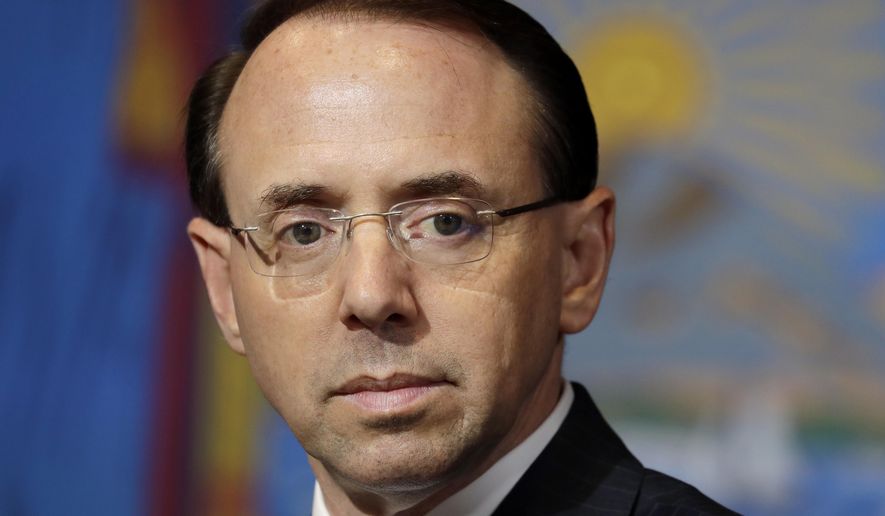President Trump on Monday said he will not fire Deputy Attorney General Rod Rosenstein, ending weeks of speculation about the high-ranking Justice Department official’s fate in the wake of a report that he discussed secretly taping the president and talked about invoking the 25th Amendment to remove him from office.
As the president boarded Marine One for a trip to Orlando, Florida, to speak before a group of national and international police chiefs, he was asked if he planned to fire Mr. Rosenstein.
“No, I don’t,” Mr. Trump responded.
Mr. Rosenstein accompanied Mr. Trump aboard Air Force One to Orlando. The two men spoke for about 45 minutes discussing law enforcement officials, border security, violent crime in Chicago and general Justice Department business, according to White House spokesperson Hogan Gidley. White House Chief of Staff John F. Kelly and Principal Associate Deputy Attorney General Edward O’Callaghan were also in the meeting.
Mr. Gidley confirmed to reporters that Mr. Rosenstein still has his job.
During his remarks to the International Association of Police Chiefs, Mr. Trump thanked Mr. Rosenstein for coming to Florida, saying they had a good talk.
“We flew down together,” Mr. Trump said. “The press wants to know ’What did you talk about?’ But we had a very good talk, I will say.”
The president’s positive spin on his relationship with Mr. Rosenstein was in sharp contrast to earlier criticism Mr. Trump has lobbed at the Justice Department’s No. 2 official, who is overseeing special counsel Robert Mueller’s probe into alleged Russian collusion and the Trump campaign.
The president told reporters that he was “looking forward” to traveling with Mr. Rosenstein, saying “that will be very nice.”
“I didn’t know Rod before, but I’ve gotten to know him, and I get along very well with him,” Mr. Trump said before departing for Orlando.
Last month, The New York Times reported that Mr. Rosenstein talked about secretly taping the president and possibly trying to oust him via the 25th Amendment after ex-FBI Director James B. Comey was fired in May 2017.
The allegations were reportedly detailed in notes authored by former FBI Deputy Director Andrew McCabe.
Mr. Rosenstein has denied the report, calling it “factually inaccurate.”
The report cast doubt on Mr. Rosenstein’s future with the Justice Department. Some media reports claimed Mr. Rosenstein would be fired, while others said he was planning to resign.
Shortly after The New York Times article surfaced in late September, Mr. Trump planned a meeting with Mr. Rosenstein. Ultimately, the president canceled the meeting so he could focus on the battle over his Supreme Court nominee Brett M. Kavanaugh, who was confirmed on Saturday.
Although the meeting with Mr. Trump was pushed back, Mr. Rosenstein did have a met with Mr. Kelly just days after The New York Times report. The meeting appeared to be friendly.
Mr. Trump weighed in on Mr. Rosenstein’s future during a news conference at the United Nations General Assembly two weeks ago. The president said his preference was to keep Mr. Rosenstein.
“We’ve had a good talk,” Mr. Trump said at the time. “He says he never said it, he doesn’t believe it, he said he has a lot of respect for me, and he was very nice, and we’ll see.”
Mr. Rosenstein’s departure could plunge the Mueller probe into chaos. Attorney General Jeff Sessions has recused himself from the investigation. If Mr. Rosenstein departs, the investigation would fall to Solicitor General Noel Francisco because the No. 3 position at the Justice Department is currently vacant.
Mr. Trump has repeatedly called the Mueller probe a politically motivated witch hunt.
Although Mr. Rosenstein will remain at the Justice Department, he could still face difficult questions this week. Two House committees investigating FBI and Justice Department decisions during the 2016 election have asked to speak with Mr. Rosenstein on Tuesday regarding The New York Times article.
Rep. Mark Meadows, North Carolina Republican, and a member of the House Judiciary Committee, one of the panels probing bias at the Justice Department, said Mr. Rosenstein needs to come before Congress and explain himself.
Mr. Rosenstein is expected to speak with lawmakers Thursday in a closed-door, transcribed interview setting.
“Even though I’ve been a strong critic, I think he has to have the ability to come before us and say what he did say or didn’t say,” the congressman said in an interview with The Hill.
• Jeff Mordock can be reached at jmordock@washingtontimes.com.




Please read our comment policy before commenting.